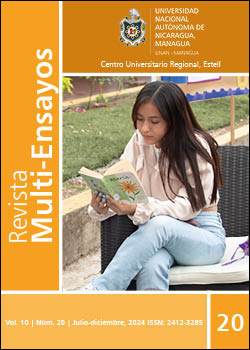Conception of language from scientific paradigms
DOI:
https://doi.org/10.5377/multiensayos.v10i20.18678Keywords:
Linguistics, theories, epistemology, language, philosophyAbstract
Language has been a phenomenon that has caused many questions. Cognitive sciences have generated a variety of theories about its nature, purpose and methods for its study. The ontology of language maintains that language not only describes reality, but also shapes, transforms and positions it before the world. Furthermore, depending on the epistemological stance adopted, the research approach to the phenomenon varies. This implies that each theoretical perspective provides a different understanding of the function and structure of language. Consequently, the aim of this descriptive essay is to describe the main theoretical conceptions of language according to the main scientific paradigms. Although the latter are numerous, this essay deals with the best-known ones: Greek thought, empiricism, rationalism, positivism, critical rationalism, critical theory, phenomenology, hermeneutics and complexity. It is concluded that the concept of language is still in constant evolution and redefinition.
Downloads
780
HTML (Español (España)) 326
Published
How to Cite
Issue
Section
License
Copyright (c) 2024 Revista Multi-Ensayos

This work is licensed under a Creative Commons Attribution-NonCommercial-ShareAlike 4.0 International License.

